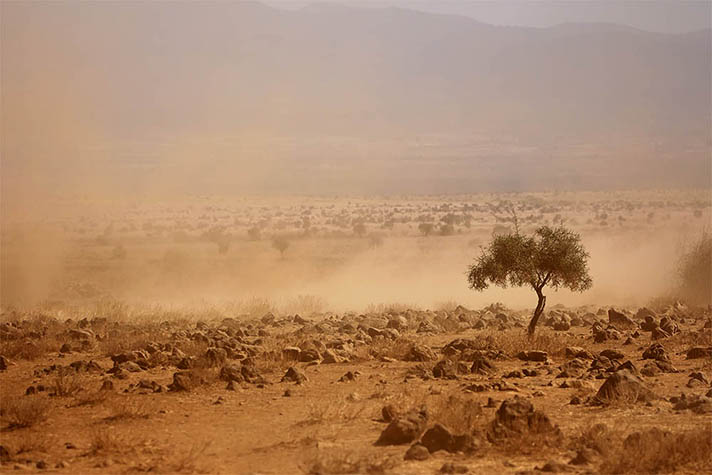
‘Sir, give me this water so that I won’t get thirsty and have to keep coming here to draw water.’ —John 4:18
Precious, precious water! Where I grew up in Africa as the child of missionaries, we had no access even to a well, and certainly no running water—so there were no faucets in our tin-roofed bungalow. When it came to bath time, the water was brought in old kerosene tins. My baby sister was bathed first; then my younger brother and me in the same water; next our older brother, followed by my mother—still in the same water—and last of all, our poor dad!
Water in Africa was like gold, as it was two millennia ago when a man from Nazareth stopped in dry, dusty Samaria to rest by a well that was then at least 1,700 years old (John 4:4).
He had sent His companions ahead to buy food, when a local woman arrived to draw water. And then, against the conventions of the day, Jesus opened up with a request for a drink from the alien Samaritan. The teaching that followed on “living water” has brought millions of readers into an entirely new view of life and its meaning!
1. We learn to see Thirst as Unrest
It was the subject of water that led to the Lord’s comment: “If you knew the gift of God and who it is that asks you for a drink, you would have asked him and he would have given you … living water.”
Really? She must have wondered.
Jesus spoke of the difference between the ever-recurring thirst for natural water, and the quenching of all thirst by the water that He gives—with its promise of eternal life. She breaks in: “Sir, give me this water so that I won’t go thirsty.”
Some serious talking was beginning. Here was Christ’s lead-in to a greater understanding; to see thirst as unrest. His discernment that the woman had already gone through five marriages made an age-old point.
In the U.K., the BBC transmitted a television series on Lord Byron, the greatest English poet of the 18th century. Every possible appetite of his body had to be satisfied. In one of his poems he described his own experience:
Drank every cup of joy,
heard every trump of fame;
drank early, deeply drank.
Drank draughts which common
millions might have drunk.
Then died of thirst, because there
was no more to drink.
The “thirsty’ can be found among the great and the good. On June 17, 1868, the scientist Charles Darwin wrote a letter to a friend, J.D. Hooker: “I am glad that you were at The Messiah. It is the one thing I should like to hear again. But I dare say I should find my soul too dried up to appreciate it as in olden days. For it is a horrid bore to feel as I constantly do; that I am a withered leaf, for everything except science.”
A horrid bore … a withered leaf … too dried up? Christ speaks to such conditions! Yet there’s more …
2. We learn to see Water as a Person
The Samaritan woman attempted to deflect Jesus’ recognition of her need by referring to the differences between Samaritans and Jews. But the Lord insisted that no moral or spiritual problems were ever solved by inherited orthodoxy or by correct ritual—but only by receiving new life in the Spirit (John 4:21-24).
From the Bible we learn that “living water” is essentially a person—who, by His saving death, sprinkles clean water on His people, indwelling them by the power of the Spirit (Ezekiel 36:25; John 7:37-39).
Thereupon, the Samaritan woman began to speak of the hoped-for coming Messiah who would surely explain everything. Then came the supreme moment of self-disclosure, when Jesus replied, “I, the one speaking to you—I am he” (John 4:26).
It was at that precise point that Jesus’ disciples come back from their shopping trip! They seemed mainly concerned about the food that they had brought. But as for the Samaritan—she was off into the town with a mission about Christ’s identity: “Come!” she gasped to her hearers, “Come see a man who told me everything I’ve ever done. Could this be the Messiah?”
How her vocabulary had changed! At verse 9 she referred to Jesus as no more than “a Jew.” Then in verse 11 it becomes “Sir.” Next, in verse 19, her term is “a prophet.” Finally, in verse 29, it’s “the Messiah.”
By the end of the account, it is not only she who has become a believer, but also the townspeople—who stream out to meet Jesus, finally becoming convinced that He was indeed the world’s Savior. This had become an amazing one-woman mission!
3. We learn to see Drinking as Believing
Here was the prophetic fulfillment of Isaiah 55, where the Lord God invites all who are thirsty to “come to the waters,” to “give ear and come to me.” What, then, is faith? Faith is coming; faith is buying—without money and without price; faith is drinking.
That unknown Samaritan speaks to us, and says, “Echo my own words this very day, and say, to the Man of Galilee, ‘Sir, give me this water that I thirst not.’”
It was evangelist D.L. Moody of Chicago who, speaking of his earlier days, testified, “I was all the time, tugging and carrying water. But now I have a river that carries me.” ©2016 Richard Bewes
Bible verses are taken by permission from The Holy Bible, New International Version®, © 1973, 1978, 1984, 2011 by Biblica, Inc.™ Used by permission. All rights reserved worldwide.
Richard Bewes is a preacher, broadcaster and hymn writer. He serves on the board of the Billy Graham Evangelistic Association in the United Kingdom and is the former rector of All Souls Church, Langham Place, London.
